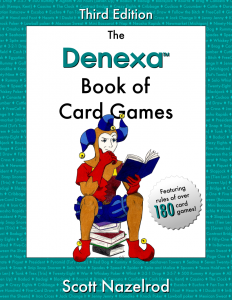What does “According to Hoyle” mean?
 You might have heard the phrase “According to Hoyle”, meaning “by-the-book” or “in the proper manner”. But who the heck is Hoyle, anyway, and why should we do things according to what he says?
You might have heard the phrase “According to Hoyle”, meaning “by-the-book” or “in the proper manner”. But who the heck is Hoyle, anyway, and why should we do things according to what he says?
The life of Hoyle
The Hoyle in question is Edmond Hoyle (also sometimes spelled Edmund Hoyle), an English writer who was born in 1672. While we don’t know a lot about his personal life, we do know a lot about cards from him. The earliest that we know of him was that he was tutoring the English aristocracy at Whist by 1741.
The following year, Hoyle expanded the notes he sold to his Whist students into A Short Treatise on the Game of Whist, which was not much more than a small pamphlet. Despite its high price of one guinea, it quickly sold out. Rather than reprint the pamphlet himself, Hoyle sold the rights to the pamphlet to Francis Cogan for 100 guineas. Meanwhile, pirates began publishing copies of A Short Treatise on the Game of Whist under the name “A Gentleman”. To distinguish the genuine article from the pirated copies, Cogan paid Hoyle twopence to autograph each copy he printed. This probably worked pretty well for Hoyle, but Cogan couldn’t make much money off of it, especially after having been forced to lower the price to compete with the pirates.
Hoyle then began to write about other games. In 1743, he published A Short Treatise on the Game of Backgammon. Later that year, he followed his first treatise up with An Artificial Memory at the Game of Whist in 1743. Cogan began publishing collections that included all three of these works. Hoyle continued writing about new games, including treatises on Piquet, Quadrille, Brag, and even Chess. He continued to revise his earlier works as well; A Short Treatise on the Game of Whist went through fourteen editions in his lifetime.
Hoyle’s legacy
Edmond Hoyle died in 1769. Despite that, the publishers continued on printing Hoyle’s work, even revising and augmenting it. A Short Treatise on the Game of Whist remained the gold standard of Whist rules until well into the nineteenth century. Despite that, there were some that were beginning to question Hoyle’s strategic advice. Whist was still in its early days when he had written about it. As the game matured and its players concocted new strategies, Hoyle’s axioms weren’t aging well. Thomas Mathews went so far in his 1804 book Advice to the Young Whist Player as to write “[Hoyle] himself, so far from being able to teach the game, was not fit to sit down even with the third-rate players of the present day.”
Hoyle books began to be published that contained more games that Hoyle had never written about. The Hoyle brand was so strong that some authors even began writing books with “Hoyle” in the title that consisted entirely of original content, and nothing written by Hoyle at all. As this practice continued, Hoyle books began including games that hadn’t even been invented yet when Hoyle died. This seemed to irritate John Scarne, who titled a chapter of Scarne on Cards as “Poker—Not According to Hoyle”. In it, he writes:
“It seems as intelligent to me as some research engineer’s publishing a monograph titled ‘Fulton on Diesel Engines’ or ‘William the Lion-Hearted on Atomic Energy.’ With this exception: the writers on Poker who have put on the mantle of Hoyle and handed down their own private prejudices about the game have simply reduced Poker rules to utter confusion. Poker players, confronted by a shelf of Hoyles who don’t know what they’re talking about, have been compelled to formulate and live by their own regional, village or house rules. It has created a not-too-healthy atmosphere in which to play for money.”
Scarne suggested that poker instead be played “according to Scarne” rather than “according to Hoyle.” Unsurprisingly, it didn’t take: the governing rules of modern poker are Bob Ciaffone’s “Robert’s Rules of Poker”, not Scarne’s. Adding insult to injury, Edmond Hoyle was posthumously inducted into the Poker Hall of Fame in 1979.


